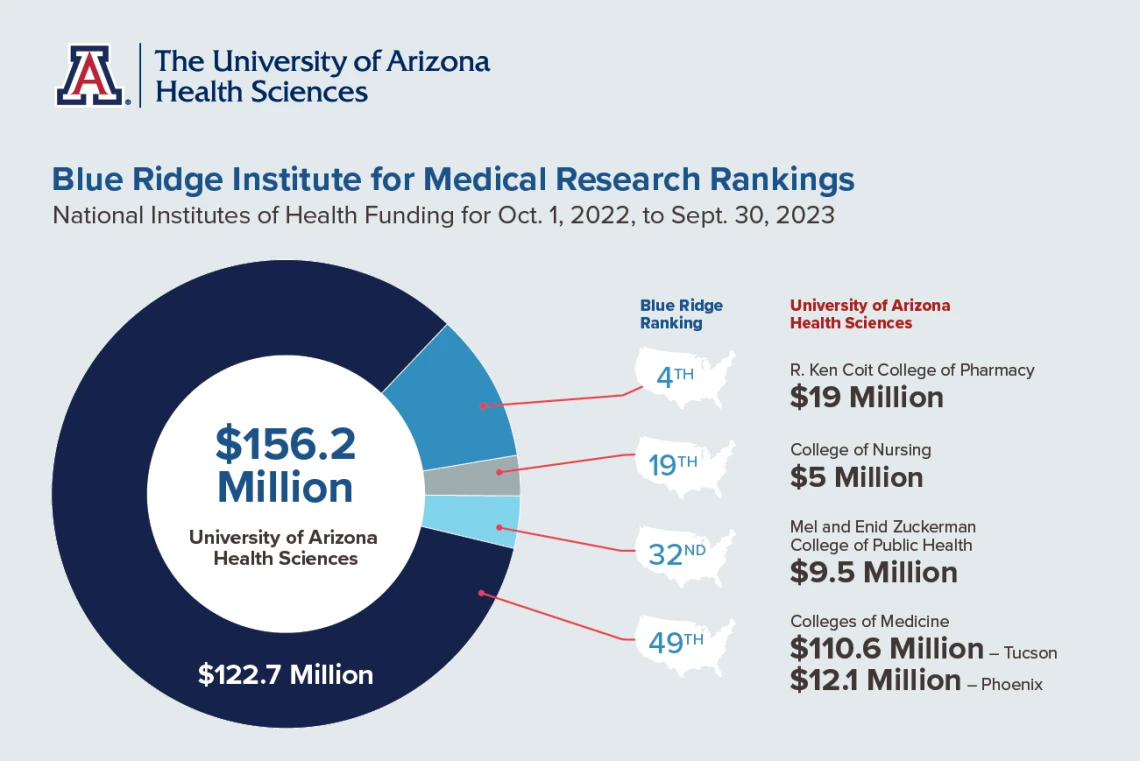NIH funding increases lead to impressive performance in Blue Ridge rankings
Five colleges increased their National Institutes of Health research funding in 2022-2023, leading to higher rankings for some by the Blue Ridge Institute for Medical Research.

Several colleges at the University of Arizona Health Sciences increased their National Institutes of Health funding in 2022-2023, leading to a strong showing overall in the annual Blue Ridge Institute for Medical Research rankings.
The National Institutes of Health, or NIH, is the largest public funder of biomedical research in the world. The Blue Ridge Institute for Medical Research is a nonprofit organization that annually ranks U.S. institutions, investigators, medical and health sciences schools based on the funding they receive from the NIH.
The UArizona R. Ken Coit College of Pharmacy increased its funding by nearly $5 million, rising two spots in the rankings to finish at No. 4 with $19 million.
“I am excited to break into the top 5 with a ranking of No. 4. Our faculty are outstanding and work hard to advance their science and health care,” said Rick Schnellman, PhD, dean of the Coit College of Pharmacy.
The UArizona College of Nursing improved its ranking for the fourth consecutive year and finished in the Top 20 for the first time, ending up at No. 19 with just over $5 million in NIH funding.
“I am very proud of our faculty, who engage in research aimed at creating new modes, methods and models to enhance health and well-being in communities across Arizona and worldwide. They are revolutionizing health care delivery and disease management and bolstering the nursing workforce. Our innovative research is dedicated to achieving health equity and making a tangible difference in the field,” said Hyochol Brian Ahn, PhD, dean of the College of Nursing.
The Mel and Enid Zuckerman College of Public Health, which receives much of its funding from the U.S. Centers for Disease Control and Prevention and other federal agencies, advanced four spots to No. 32 in the rankings thanks to $9.5 million in NIH funding.
“We are pleased that our NIH research funding is increasing, and that is what Blue Ridge tracks,” said Iman Hakim, MD, PhD, dean of the college, “Our Zuckerman College of Public Health also receives substantial awards from the CDC and other federal agencies like the EPA, HRSA, FEMA, and USDA to support public health research and improve health for all.”
The UArizona College of Medicine – Tucson and UArizona College of Medicine – Phoenix, which the Blue Ridge Institute for Medical Research combines in the rankings, increased from $114.1 million to a combined $122.7 million in awards and maintained their No. 49 ranking. The College of Medicine – Phoenix posted the most significant increase in NIH funding, jumping from $5.2 million last year to $12.1 million this year. The College of Medicine – Tucson garnered $110.6 in NIH funding, up from $108 million last year.
“The College of Medicine – Phoenix is proud to have increased our federal research funding by 130% in one year,” said Fredric Wondisford, MD, MBA, dean of the College of Medicine – Phoenix. “Our medical school is transitioning into a rapid-growth phase, building core teams of interdisciplinary investigators to advance discovery in cardiovascular science, mental health, metabolic disease and neurosciences that will impact the health and well-being of the communities we serve.”
“We are excited to see steady growth in research funding and proud to foster an environment that is permeated by research activity,” said Michael M.I. Abecassis, MD, MBA, Iovanna C. Lopez dean of the College of Medicine – Tucson. “Advancing the field and science of medicine benefits the patients we serve and the students and physicians we train.”
Overall, the University of Arizona advanced to No. 49 with $197.9 million in NIH funding.
The new research projects that contributed to the rankings include:
- A National Institute of Allergy and Infectious Diseases grant awarded to Hongmin Li, PhD, professor and R. Ken and Donna Coit Endowed Chair in Drug Discovery at the Coit College of Pharmacy and a BIO5 Institute member. Li’s research seeks to identify compounds that may lead to the development of more specific and effective immune therapies to treat multiple sclerosis;
- A Eunice Kennedy Shriver National Institute of Child Health and Human Development grant to Elise Erickson, PhD, CNM, associate professor in the College of Nursing and member of the BIO5 Institute. Erickson is studying postpartum hemorrhage and using non-invasive genetic biomarkers to develop new ways to predict risk for hemorrhage before birth. The goal is to design treatments that are more effective, thereby saving mothers’ lives and minimizing long-term health problems;
- An award from the National Heart, Lung, and Blood Institute to Patricia Haynes, PhD, professor in the Zuckerman College of Public Health. Haynes seeks to identify key factors for the successful implementation of workplace sleep coaching to improve sleep health in Arizona firefighters;
- An award from the National Heart Lung and Blood Institute to Michael Fallon, MD, professor and chair of the Department of Medicine in the College of Medicine – Phoenix. Fallon and his research team hope to develop effective treatments for hepatopulmonary syndrome, the most common lung complication in cirrhosis;
- A grant from the National Institute on Aging to Janko Nikolich, MD, PhD, professor and head of the Department of Immunobiology at the University of Arizona College of Medicine – Tucson, director of the Center on Aging and BIO5 Institute member. Nikolich’s study is aimed at paving the way for interventions to improve T cell immunity and healthspan in older adults, providing also for substantial health care and overall economy savings and benefits.
Media contact:
Phil Villarreal
UArizona Health Sciences Office of Communications
520-403-1986
pvillarreal@arizona.edu

